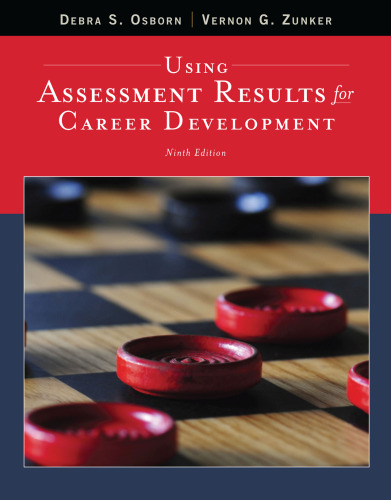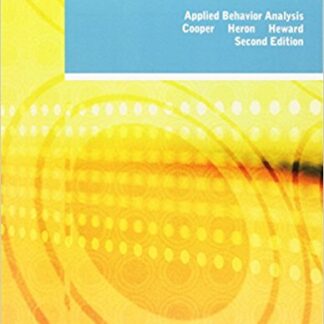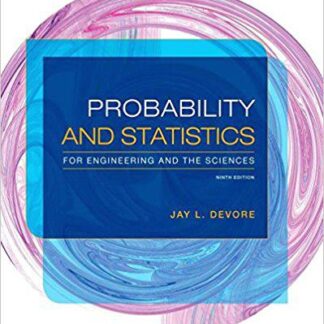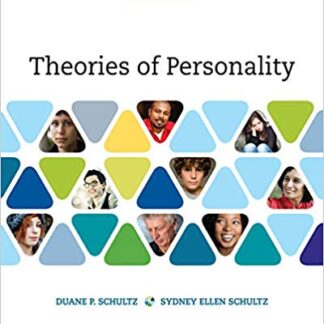Description
Using Assessment Results for Career Development 9th Edition by Debra S. Osborn, ISBN-13: 978-1305397774
[PDF eBook eTextbook] – Available Instantly
- Publisher: Cengage Learning; 9th edition (March 3, 2015)
- Language: English
- 272 pages
- ISBN-10: 1305397770
- ISBN-13: 978-1305397774
Reflecting the latest practices from the field, USING ASSESSMENT RESULTS FOR CAREER DEVELOPMENT, 9th Edition vividly illustrates how to use assessment instruments to increase clients’ self-awareness and help them make rational career choices. Extremely practical, this hands-on text delivers detailed information on using assessment results in a wide variety of counseling situations. Case studies, charts, bulleted and numbered lists, dialogues, and agency addresses help readers effectively apply their knowledge of tests and measurements in clinical settings-ensuring that they truly master the use of assessment instruments.
Table of Contents:
Title Page
Brief Table of Contents
Table of Contents
Preface
Chapter 1: A Conceptual Model for Using Assessment Results
Advanced Organizer
Conceptual Perspective: Career Development through Assessment
Rationale for Assessment
Preparing the Practitioner for Using Assessment Results
A Model for Using Career Assessments in Career Counseling
The Importance of Relationship
Zunker’s Model for Using Career Assessments
Using the Model for Individual Counseling: A Case Example
Using Career Assessments to Stimulate Career Exploration in Groups
Adapting the Assessment Model to Groups
General Overview of This Book
Summary
Questions and Exercises
Chapter 2: Interpreting Assessment Results
Advanced Organizer
A Trait-Factor Approach to Assessment Interpretation
Connecting Career Assessments and Career Development Theories
Four Uses of Assessment
Diagnostic Uses of Assessment
Predictive Uses of Assessment
Comparative Uses of Assessment
Developmental Uses of Assessment
How, When and Whether to Use Assessment Results
Culturally Appropriate Career Assessment
General Steps to Interpreting Results
Emphasis on Dialogue
Using Holland Codes for Interpretation
International Career Testing
One-Shot Career Counseling
Career Counseling: Science, Education or Art?
Summary
Questions and Exercises
Chapter 3: Some Measurement Concepts
Advanced Organizer
Norms
Norm Tables
National Norms
Local Norms
Score Profiles
Differences between Scores
Relation of Norms to the Shape of a Profile
Scores as a Range
Transformation of Scores
Bell-Shaped Curve
Percentile Equivalents
Standard Scores
Stanines
Grade Equivalents
Criterion-Referenced Tests
Accuracy of Measurement
Reliability and Validity
Standard Error of Measurement (SEM)
Standard Error of Differences (SED) between Two Subsets
Expectancy Tables
Correlations
Summary
Questions and Exercises
Chapter 4: Ethics and Assessment
Advanced Organizer
The Purpose of Ethical Standards
Competence
Client Needs
Cultural Differences
Gender Issues
Sexual Orientation Issues
Confidentiality
Orientation
Technology and Assessments
Summary
Questions and Activities
Chapter 5: Aptitude and Achievement Tests
Advanced Organizer
Aptitudes
Aptitudes and Skills through the Lens of Theory
Aptitude Tests
Measured versus Expressed Skills
History Impacts on Aptitude Testing
Multi-Trait Measures
Types of Aptitude Tests
Review of Specific Aptitude Tests
Armed Services Vocational Aptitude Battery (ASVAB)
Aptitude Testing and People with Disabilities
Forensic Case in Which a CRC Has Been Asked to Be an Expert Witness
Multi-Aptitude Tests: Limitations and Suggestions for Use
Other Aptitude Tests
Achievement Tests
Difference between Aptitude and Achievement Tests
Do Beliefs Impact Achievement Scores?
Do Achievement Tests Predict Success?
Interpreting Scaled Scores for Achievement Tests
Types of Achievement Tests
Review of Specific Achievement Tests
Using Achievement Test Results for Self-Concept and Self-Efficacy Development
Suggestions for Career Development
Other Achievement Tests
Summary
Questions and Exercises
Chapter 6: Interest Inventories
Advanced Organizer
RIASEC Theory
Other Career Theories and Interests
Stability of Interests
Racial and Cultural Bias of Interest Inventories
Interpreting Interest Inventories
Interpreting Flat, Depressed, and Elevated Profiles
Profile Elevation
When RIASEC Codes Differ across Inventories
Review of Specific Inventories
Using the CISS in Counseling
Developing a Game Plan
Using the CDM-R in Counseling
Suggestions for Career Development
Other Interest Inventories
Summary
Questions and Exercises
Chapter 7: Using Personality Inventories
Advanced Organizer
The Role of Personality and Career Theory
Research on Personality Inventories
Using Personality Assessments in Career Counseling
Myers-Briggs Type Indicator (MBTI) Instrument
Using the NEO in Career Counseling
Suggestions for Career Development
Other Personality Inventories
Summary
Questions and Exercises
Chapter 8: Career Beliefs and Decision-Making Inventories
Advanced Organizer
Theoretical Aspects of Career Decision Making
Impact of Beliefs on Career Decision Making
Review of Specific Career Decision Making Inventories
Using the BESI with a Job Search Strategies Class
Other Career Decision Inventories
Summary
Questions and Exercises
Chapter 9: Computer-Assisted Career Guidance and Online Career Assessments
Advanced Organizer
Online Inventories versus Online Career Systems
Ethical Issues with Computerized Career Assessments
Using Computerized or Online Assessments in Career Counseling
Other Types of Technological Assessments-Social Media, Apps and Games
Review of Specific CACGS and Online Systems
Other CACGS and Online Assessments
Summary
Questions and Exercises
Chapter 10: Card Sorts and Other Non-Standardized Approaches in Career Counseling
Advanced Organizer
Description of Card Sorts
Advantages and Disadvantages of Card Sorts
Basic Instructions
Sorting Behaviors
Sorting Alone or with the Counselor Present
Task Approach Behaviors
Interpreting Card Sort Results
Avoidance Themes
The Peterson and Lenz Approach
Clients Who Might Benefit from Card Sorts
Sample Card Sorts
The Career Values Card Sort Planning Kit
Using the Career Values Card Sort in a Career Advising Session
Motivated Skills Card Sort Planning Kit
Other Card Sorts
Using Non-Standardized Tools in Career Counseling
Career Construction Interview
Work History via Resume Analysis
Five Lives
Ideal Day
Life/Career Collage
Career Genogram
Other Non-Standardized Approaches
Summary
Questions and Exercises
Chapter 11: Combining Assessment Results
Advanced Organizer
Using a Model for Combining Assessment Results
Combining Separate Tests and Inventories
Summary
Questions and Exercises
References
Name Index
Subject Index
Debra S. Osborn (Ph.D., Florida State University) is an associate professor in the department of Counselor Education at Florida State University. She has an established program of research with three specific foci. These include the design and use of technology in counseling, innovation and effectiveness in counselor education, and the design and use of assessments in career services. Dr. Osborn is passionate about career counseling, having served as president of the National Career Development Association and as a counselor educator for almost two decades.
Vernon Zunker is a retired professor from Southwest Texas State University. He earned his Ed.D. with an emphasis on counseling from the University of Houston and completed a residency in clinical psychology at the University of Texas Medical School at Galveston. Although retired from teaching, Dr. Zunker continues to push the discipline forward by keeping career counseling relevant to all counseling students.
What makes us different?
• Instant Download
• Always Competitive Pricing
• 100% Privacy
• FREE Sample Available
• 24-7 LIVE Customer Support




